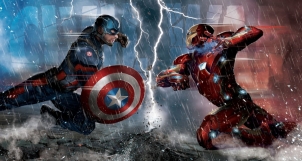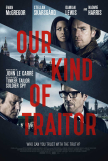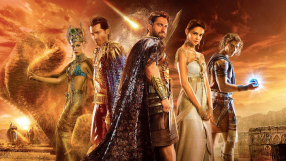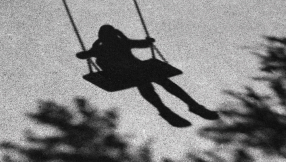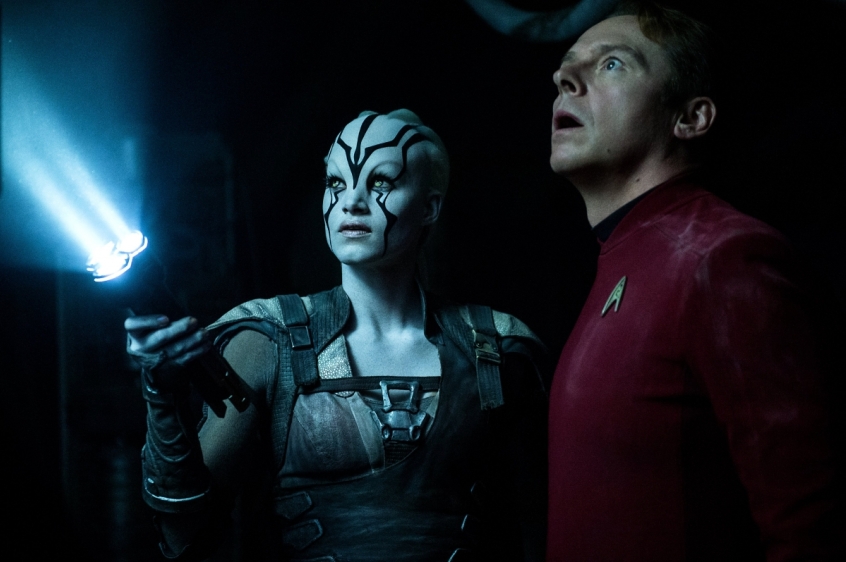
Science fiction almost always seems to take place in a godless universe. I suppose the 'science' part of that title is the clue as to why: these are the stories which celebrate the breaking frontiers of human achievement, the imagined possibilities of where our collective ingenuity might one day take us. What's more, sci-fi so often takes us up into the stars – where previous generations imagined heaven must be located – and finds only astronomical phenomena and a playground for adventure. God's not there.
That's certainly the premise behind Star Trek, the sprawling sci-fi saga which gets yet another cinematic outing this month with Star Trek Beyond. It's about the crew of the most advanced spaceship ever built, on a five-year mission to explore deep space, discovering extraordinary new worlds and intense dangers at every turn. But God is nowhere to be found; as if the universe has advanced past their primitive need for him.
The third film in JJ Abrams' reboot series (although Abrams is only producer this time around), Star Trek Beyond follows Captain James T Kirk (Chris Pine) and the crew of the USS Enterprise as they answer a distress call in uncharted space. Of course, things aren't as they seem, and the ship comes under devastating attack from Idris Elba's maniacal Krall, who wants to steal a weapon that Kirk has unwittingly stored on the ship. As the trailer reveals, the Enterprise is smashed to pieces, the crew are scattered on a nearby planet, and death for everyone involved is almost certain. Dramatic odds, but that's always the point.
Sci-fi stories might be godless, but they inevitably create these situations of intense darkness in order to explore some actually very spiritual ideas: depth and development of character; the responsibilities of leadership; the need for a saviour; hope.
Holding on to hope in the face of the seemingly impossible is often the driving force for protagonists in science fiction –we see overwhelming odds being overcome in almost every major sci-fi and fantasy story. Hope and redemption are so often key to the genre, despite being such unscientific ideas. That's also the case here, where they take thematic centre-stage alongside the concept of unity. Kirk believes there's strength in working together; Krall sees unity as a weakness. The latter seeks to divide and conquer; the former sees human unity as a key driver of that hope.
All of this makes the film feel incredibly relevant and timely for us in the real world, where we're currently a little short on hope, and left wondering whether the sort of unity and solidarity we've seen after recent atrocities is enough to overcome the evil displayed by individuals. Elba's character might be a fiction, but the truth is that the world is currently far too full of people who really will kill indiscriminately to advance their own cause. Star Trek Beyond asks us, even in the context of a 12A sci-fi action movie, whether we still believe such people can be overcome.
It's a bit scary in places to warrant that certification (one character gets gorily splattered by said super-weapon), but that's literally my only complaint with the movie. With expectations lowered by the appointment of Fast and the Furious 3-6 director Justin Lin, I found Star Trek Beyond a thrilling surprise. The film delivers everything you want from blockbuster sci-fi; thrilling set pieces, a twisting, exciting plot, and just enough logic to allow you to follow along unhindered. I'm no trekkie but it's clearly both packed with knowing references for fans and straightforward enough to be enjoyed by total Star Trek novices. Given the interesting thematic content, that means the movie works on a host of levels – and that's a credit to Lin and to his able ensemble cast: Pine, Elba, Karl Urban, Zachary Quinto, Zoe Saldana and the rest.
Special mention though should go to Simon Pegg, whose influence on the film is huge. Not only does his character Scotty continually brighten proceedings; he's also co-author of the script, and his fingerprints are all over it. It's consistently witty, manages to include a reference to his cult channel 4 sitcom Spaced, and most importantly tells a really good story. For me it's one of the best blockbuster movie scripts in a long while.
It also sets up a quite extraordinary set-piece near the end of the movie which is worth the entrance fee on its own. I won't spoil it, but it's one of those rare and wonderful moments where action films reach the very pinnacle of their potential; think the T-Rex chase in Jurassic Park. When it happened, I was grinning like the teenage boy at which the movie is undoubtedly aimed; I'm slightly jealous now of anyone who gets to experience it for the first time.
Unlike so many other current sci-fi and fantasy films, Star Trek Beyond doesn't try to create the ultimate, epic, apocalyptic scenario. It's happy to simply be a good romp and a good piece of space opera storytelling, and it's much the stronger for it. Yet while it celebrates the best of human achievement and potential, it can't do so without drawing on that unscientific idea of hope. Mr Spock wouldn't approve of such an illogical thought, but it seems to me that the 'beyond' of the title isn't the final frontier of uncharted space, but simply the realisation that hope transcends.
Martin Saunders is a Contributing Editor for Christian Today and the Deputy CEO of Youthscape. Follow him on Twitter @martinsaunders.










